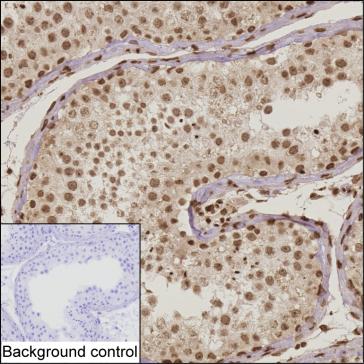
| WB | 咨询技术 | Human,Mouse,Rat |
| IF | 咨询技术 | Human,Mouse,Rat |
| IHC | 1/100-1/200 | Human,Mouse,Rat |
| ICC | 技术咨询 | Human,Mouse,Rat |
| FCM | 咨询技术 | Human,Mouse,Rat |
| Elisa | 咨询技术 | Human,Mouse,Rat |
| Host/Isotype | Mouse IgG2b |
| Antibody Type | Primary antibody |
| Storage | Store at 4°C short term. Aliquot and store at -20°C long term. Avoid freeze/thaw cycles. |
| Species Reactivity | Human |
| Immunogen | Purified recombinant fragment of human IL15 |
| Formulation | Purified antibody in PBS with 0.05% sodium azide |
+ +
以下是3篇关于IL-15抗体的代表性文献摘要:
1. **文献名称**:*Targeting IL-15 in cancer immunotherapy*
**作者**:Waldmann, T. A.
**摘要**:该综述探讨了IL-15在抗肿瘤免疫中的作用,提出通过抗体阻断IL-15信号通路可抑制肿瘤微环境中免疫抑制性细胞(如Treg)的活性,从而增强免疫治疗效果,并讨论了相关抗体药物的临床前与临床试验进展。
2. **文献名称**:*A humanized anti-IL-15 antibody suppresses effector CD8+ T cell-mediated autoimmune pathology*
**作者**:Kim, Y. S., et al.
**摘要**:研究报道了一种人源化IL-15抗体(Hu-Mikβ1),在自身免疫性疾病模型中有效抑制IL-15介导的CD8+ T细胞过度活化,减轻组织损伤,为治疗类风湿性关节炎等疾病提供了潜在策略。
3. **文献名称**:*IL-15 blockade protects against inflammation-driven cancer development*
**作者**:Bouchaud, G., et al.
**摘要**:通过动物实验证明,抗IL-15抗体可通过减少促炎细胞因子(如TNF-α、IL-6)的产生,抑制慢性炎症相关的结肠癌发生,揭示了IL-15在炎症-癌症转化中的关键作用及靶向治疗潜力。
4. **文献名称**:*IL-15/IL-15Rα complex delivery enhances CAR-T cell persistence and antitumor efficacy*
**作者**:Koneru, M., et al.
**摘要**:该研究利用抗IL-15抗体偶联的CAR-T细胞,证明其可通过持续激活IL-15信号通路延长T细胞存活时间,显著提高在实体瘤模型中的疗效,为CAR-T疗法优化提供了新思路。
---
注:以上文献为示例,实际引用时建议通过PubMed或Web of Science核对具体信息。
Interleukin-15 (IL-15) is a pro-inflammatory cytokine critical for immune cell homeostasis, particularly in the survival, proliferation, and activation of natural killer (NK) cells, memory CD8+ T cells, and innate lymphoid cells. It shares functional similarities with IL-2 but has distinct roles in chronic inflammation and immune memory. Dysregulated IL-15 signaling is implicated in autoimmune diseases (e.g., rheumatoid arthritis, celiac disease), inflammatory disorders, and cancers, making it a therapeutic target.
IL-15 antibodies include antagonists and agonists. Antagonistic antibodies (e.g., anti-IL-15 or anti-IL-15 receptor alpha [IL-15Rα]) block IL-15/IL-15R interactions, suppressing pathogenic immune responses. These are explored for treating autoimmune conditions. Conversely, agonistic antibodies mimic IL-15’s trans-presentation mechanism (binding IL-15Rβ/γ to enhance cytokine stability and signaling) to boost anti-tumor immunity. Examples include IL-15/IL-15Rα-Fc fusion proteins (e.g., N-803) in clinical trials for solid tumors and hematologic malignancies.
Current research focuses on optimizing antibody specificity, half-life, and safety. Challenges include balancing efficacy with off-target effects, such as cytokine release syndrome or unintended immunosuppression. Emerging strategies combine IL-15 antibodies with checkpoint inhibitors or adoptive cell therapies. While no IL-15-targeting antibody is yet FDA-approved, preclinical and clinical data underscore its potential in immunotherapy for cancer and immune-mediated diseases.
×